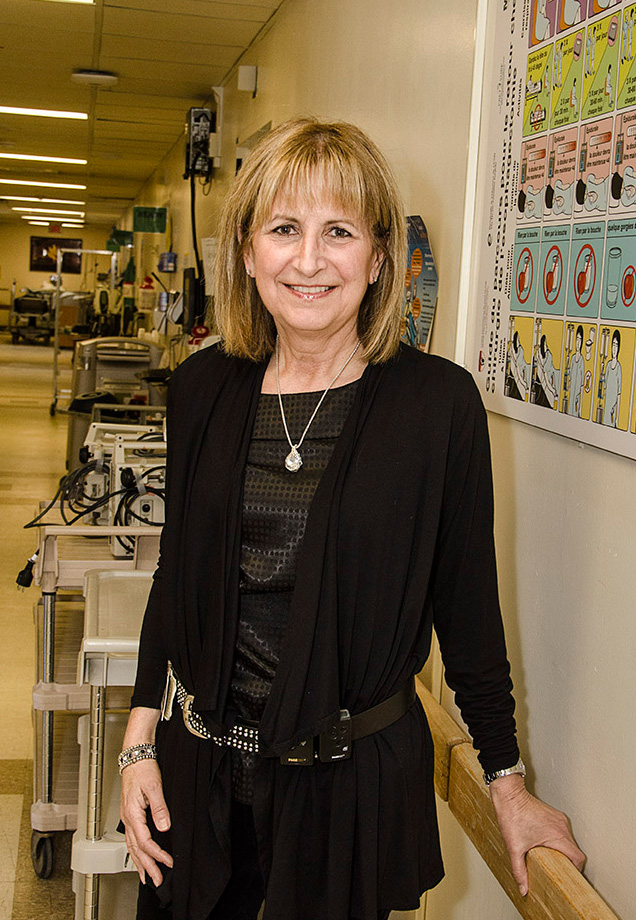March is Nutrition Month
As a Clinical Nutritionist at the McGill University Health Centre (MUHC) working with upper gastrointestinal cancer, general surgery and trauma patients, Eleanor Eckert is a critical part of the healthcare team.

Eleanor Eckert, Clinical Nutritionist at the McGill University Health Centre
“I have been here for over 30 years and I have seen the role of nutritionists become more appreciated in a hospital setting,” says Eckert. “Before we were the provider of meals and did a little diet instruction. Now the role of the nutritionist has become an integral part of the treatment plan. The healthcare field has realized that you can do the most wonderful surgeries in the world but if the patient is not properly nourished, it is well documented that patients can experience complications, such as problems with wound healing and increased length of stay.”
Eckert is the dedicated nutritionist with the largest esophageal cancer program in all of Canada located at the MUHC. Her job involves seeing patients throughout their entire trajectory in the healthcare centre.
“Typically, a patient comes in with an eating problem due to their upper GI cancer diagnosis,” says Eckert. “I follow them from diagnosis through their chemotherapy and radiation and into their surgery, and again after their surgery.”
According to Eckert, many patients are unable to swallow solid food and some people are only able to take liquids. They have generally lost a significant amount of weight and will continue to lose weight without any sort of nutritional intervention. Fortunately, Eckert sees these patients very quickly and depending on how severe a patient’s swallowing problem is, offers multiple different nutritional options. In each case, Eckert determines the patient’s likes and dislikes and depending on the stage of their swallowing impairments, they get very specific recommendations.
“The goal is to get our patients to take adequate amounts of food, whether that involves changing the texture of the food, or in extreme cases, having to insert a tube temporarily in the hospital or more permanently for use in the home,” says Eckert. “For the people who can only take liquids we make sure they are nutrient rich in order to meet their energy and protein needs. These can be things like commercial nutritional supplements such as Ensure or Boost or other nutrient dense varieties according to the patient’s status and tolerance.”
Patients can also make their own milkshakes, eggnogs and other nutrient rich foods at home. They may also need protein supplements.
For the general surgery and trauma patients Eckert sees, her approach depends on what the issues are. If they have had a recent surgery that affects their GI tract they will receive counselling in terms of diet and their new anatomy. If they are unable to eat for whatever reason, for example, their GI tract is not functional at that point in time, they will be given TPN (Total Parenteral Nutrition). This is nutrition that is delivered directly into the patient’s blood stream and bypasses their GI tract all together until they are able to resume eating orally or until they are able to be tube fed. Both the TPN and tube feedings offer complete nutrition with amino acids, fats, carbohydrates, vitamins and minerals—everything that is needed to survive
The TPN is infused via a special catheter that is often inserted into the arm, while tube feeding is provided via a tube that is inserted into the nose and threaded into the stomach or small bowel, or it is a tube that can be planted directly into the stomach or small bowel, generally through a surgical procedure.
Through this process, Eckert is always very aware of how this can change a person’s life so she explains that they are doing this with the hope that the patient will be able to eventually resume eating a normal diet to maintain their weight and to be able to go back to their regular lifestyle.
“I love my job,” she says. “Particularly when I follow patients from diagnosis to discharge and I am able to see their progression. This is very fulfilling as I know I am contributing to making a difference.”